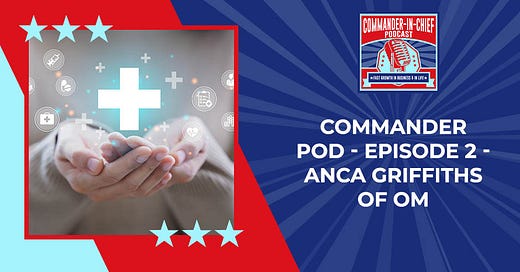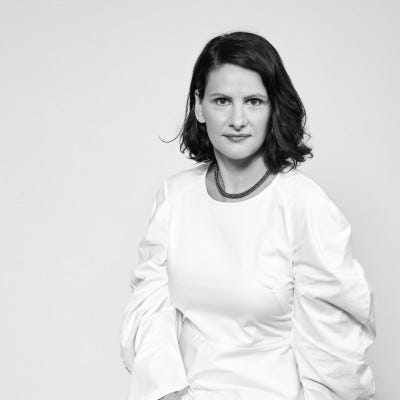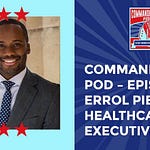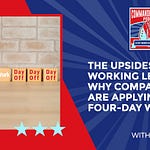Health is wealth, so healthcare should be a priority for companies wanting to give benefits to their employees. But what kind of healthcare benefits actually work? Today, OM Experts CEO Anca Griffiths gives a case for personalized medicine as a company health benefit.
Today’s conversation touches on these topics:
· The benefits of pooling the knowledge of different health experts
· Why research about women’s health is not being done properly
· Why typical company health perks do not make employees healthier
· How the masterclass format can improve health communication
· Dispelling the hype of many online health, wellness, and fitness programs
· Why prioritizing your health is important
· The value of personalized health plans
COMMANDER POD - Episode 2 - Anca Griffiths Of OM
Personalized Medicine -- As An Employee Benefit!
I know it has been a while since we put out an episode. I'm excited to do our first one for 2023. We're going to take a little bit of a different turn. I know we've spoken to a lot of tech CEOs and people that directly either have to do with HR or tech in general. One of my biggest interests is medicine and how it affects people in general and myself specifically. I'm someone who's not maybe a biohacker in the fullest sense, but I'm interested in how we can live an optimal life not just in the mental sense, but in the physical sense as well. I’m very excited to speak with Anca Griffiths who is the CEO of OM. Anca, welcome to the show.
Thank you so much. It’s very good to be here.
It’s great to have you. I would love to have you introduce yourself. Tell us a bit about what you've built and where you came from. Tell us your human story. That's one of the most interesting parts.
I'm very happy to be here. The story is a little bit interesting because I did not come from the health world. You started in the health space. I started in the luxury space. I am Canadian. I went to a business school in Canada. Very quickly after finishing school, I went to Paris to work for one of the biggest luxury groups in the world, Richemont.
I was with the group for about twelve years, six years in Paris, and then six years in APAC. Notably, I was with them during the time when luxury transitioned online. Before the early 2000s, you couldn't believe that you would buy a luxury handbag for $3,000 online. Especially the European brands would say, “You need the retail experience. You need to touch it. You need to see it. You need to have that experience with the salesperson.” It turned out that people do buy online, and they buy more. It brings it to a wider audience. That was a bit of my background.
Because of a few personal health reasons, I started looking at the online health and wellness space. I thought, “Isn't it interesting that the first place that we go to when it comes to health and wellness is online?” We're googling things. I was like, “Where is the one platform that acts a bit like the luxury space with the best health experts from across the world?” This was before COVID.
I thought, “Even with the few experiences that I had living in Canada, moving to Europe, and now living in Asia, I saw that different places are good at different things.” The US is good at certain things when it comes to health. Europe excels in other things. There's Australia, Taiwan, and Hong Kong. I thought, “Because I already had this experience of how you put a platform together that's legitimate, people trust, and brings together a high-quality product, I'll bring together the best health experts from across the world onto one platform.” I started doing that. I started contacting doctors, physiotherapists, and osteopaths to come in on different subjects.
The things that I learned from them are what shocked me about the health and wellness market in general. The need goes far beyond access to these health experts. There's a whole system behind it that's not working. That's a bit of the journey into how I created OM. I started this before COVID. I was thinking, “There are a few things I need to do. One, I need to have health experts from all over the world, but how am I going to convince people to connect with them online on video?”
Before COVID, there was no Zoom. There was no connection in this way. COVID happened and all of a sudden, I had the tech and the user habits in six months. I don't need to overcome that hurdle. There are other hurdles that we need to overcome, but that helped quite a bit to facilitate doing what I needed to do with the business. After bringing together the health experts and focusing on the subject, we decided to have a two-pronged approach, consumer and also corporate market. Now, we're focusing largely on the corporate market and bringing access to what we have to corporates. I'm happy to explain that further, but that's a bit of the creation story.
There's a very interesting thread, which I like. You said you came from luxury. There's this what I would almost call the concierge approach. It’s something that's targeted. You know who you are. You come with a certain level of sophistication. You want something that is personalized to you. It's not some generic advice like, “Get this cream,” and they’re like, “What is this for?” “Take this antibiotic.” right?
I like that. In some ways, it’s tying in very well with one business that I tried to start in the health insurance and health tech space a number of years ago. We were trying to do something like that in health insurance for Millennials. It didn't work out. We wanted to start with all that war chest. I like this approach.
I would love to delve a little bit deeper from maybe the consumer perspective. Let's say I live in New York and I'm a highly paid professional. I'm a Principal at Boston Consulting Group and maybe have some background in pre-med. That doesn't make me a doctor. At the level where I at least understand the basics, maybe I had a doctor or two in the family, I'm coming to this with a relatively clear sense of I need something specific. I need someone who's the best expert at this in my region, in the world, etc. I can now access that. It’s awesome. That makes sense.
In the corporate market, it's a little bit different animal. Forgive the term, but it is a little bit like this. The way the sausage is made is not always pretty. That's what we call it. The way that things are seen from the corporate perspective is cost. We need to be compliant. We need to provide one unified platform and one unified experience for everyone.
There's not always this sense that we may have certain sub-populations within our employee demographic, which have drastically different needs. There might be a group of women that is at a certain point in their life where they're trying to do IVF. What does that look like? Some companies are a lot better at this, and others are frankly terrible. They go to some PO and hope for the best. That's usually the end of the story.
One of the reasons why I wanted to speak with you is because I was looking at this question from a little bit different perspective. I was in insurance a number of years ago. When I hear precision medicine and employee experience, my ears perk up. I’m like, “We've arrived. Something interesting is happening here.” Maybe you could walk us through a little bit of how that works. How do you engage with corporate clients? What does the experience look like for employees?
Before I answer that, let me explain a little bit about what I discovered about the market when it comes to health and wellness. After, I'll explain how that fits into what we offer in terms of precision medicine approach to companies. When I was bringing in the health experts, I had this, “Why are they talking to me? I'm not somebody from their world. Would they even want to collaborate with me?” I was looking for experts, and we have certain criteria. 1) They're highly accredited. 2) They're speaking about a field that they're practicing in. 3) They have clinical experience working on the subject.
There is a more informal filter that I also look at. Are they trying to sell a product? Do they have protein powder or something? It's fine if they do, but the goal of our platform is not to come and push somebody to buy that. It's to come and speak on a subject that they know as experts. We started with that. The experts started coming in and they said, “We are so frustrated by seeing how people approach their health, and by the lack of information, and the misinformation in doing that. We are happy to join you.”
The other thing that they were saying is, “We want to join you because we have many skills, but we are not people that work in communication nor do we have the time to do that.” For somebody to come and say, “I will take the work that you're doing. I will work with you on making that sound interesting and appealing for people to come in on,” it’s like, “I have it. I want to share with people, but it's not reaching out there.” What's reaching out there to people is stars talking about health, key opinion leaders, or products being pushed. The experts came in on that level. That was one.
The other thing that I was shocked to discover is the male-centric medical system. This is where precision medicines started happening with us. Two of the women that are on our board, Dr. Alyson McGregor and Dr. Marjorie Jenkins, have been working on the subject their whole careers. Modern medicine has studied men and applied that to women. That's in everything from disease to diagnosis to treatment with a presumption that we are the same except for our reproductive organs. Actually, we are not. We are different in our brains. Our hearts are different. Our gut is different. That was shocking to me, especially when I looked at the numbers.
The numbers are something like in the US, 80% of medicine is ingested by women. Yet, 80% of the medicine is taken off the market because it has side effects in women. That’s because they tested it on men and applied it to women. Women metabolize drugs differently. It has different effects on them. From a business perspective, that doesn't make any sense. You don't want to not make a product for your main target.
The experts explained what is happening. Imagine that you wanted to launch a new medicine out on the market and you are going to test it on a group of ten men. You're going to test it on ten men and you're going to have similar results. It works this way. It doesn't work that way. You test it on 10 women and get 10 different results. One is postpartum. Another one is on part of her menstrual cycle and another one is on another part of her menstrual cycle. Another one is perimenopause. Another one is menopause. Another one is postmenopause. You get results all over the board. We are not as homogeneous as men are when it comes to our bodies. We respond differently.
Medication or any test that you do becomes a lot longer. It becomes a lot more difficult and more expensive as a process. When most things take 5 to 10 years, you want to shrink that down as much as possible. Until 1993, all things were tested on men and applied to women. Laws changed in 1993 and women had to be included in studies. Even now, these results are not de-aggregated. When you're looking at a subject like sports medicine which looks at fitness and nutrition, only 4% of studies are done purely on women's bodies. This is where precision medicine comes in.
Even today, only 4% of fitness, nutrition, and medicine studies are done purely on women’s bodies.
If you talk about a subject like heart health, you can't talk generally about heart health. You have to explain, “Men have heart attacks in this way,” which is the way that most of us understand. “I have tingling in my left arm. I have pressure in my chest and difficulty breathing,” that's a male heart attack, or the Hollywood heart attack as they call it.
Females have very different heart attacks. They have difficulty breathing. They’re not feeling quite right. They have pain in the stomach and migraines. The result of this lack of information on this, even though it has been out there for about twenty years, is that women go into the emergency room because they're not feeling well. Medical professionals don't know how to identify when it could potentially be something with the heart. That’s because female heart attack is explained as atypical symptoms, not symptoms of the female populations. Doctors don't realize what it is and they send them home. Women are 70% more likely to die of heart attacks than men because they're being sent home.
The numbers jump off the page when it comes to this one-size-fits-all medicine approach that we've had. We've had that because of what I've explained in terms of the medical system that has studied male bodies, and then the product was pulled from that. Media has only pulled from that without ever raising attention to you. It might not work for you. We want to push products to as large of a mass market as possible. We don't say, “Intermittent fasting might not work for you.” We want to say, “You got to do it. It's the best thing. It'll do so many things.” It depends.
One thing that I realized is precision medicine is huge, especially when it comes to the sex that you were born with because each cell in our body has sex. From there, you can dissect it even further. That can be according to age, health condition, or ethnic background. African-Americans in the US have much higher rates of hypertension than the rest of the population.
With our health experts, this is what we do. We bring in the health experts and then they focus on a subject. They’re like, “We are going to look at heart health for women,” or, “We're going to analyze brain health.” It's always going to have the spectrum of, “Male brains are this way. Female brains are this way.” That can be on a spectrum, but these are the things that you need to know about aging, memory, or learning. Health becomes different in that way.
The last thing that I realized is because I was bringing these health experts in, I thought, “There's a new study that came out that proves that women's hearts are different. They have heart attacks. All medical schools are going to be taught that from Australia to Canada to Israel, and then we're done.” It takes seventeen years from the time that something new comes out until it's applied across the board with health practitioners. On most subjects that we're looking at, whether it's gut health, mental health in different ways, or cardiac diseases, this information is out there, but it's not accessible to all, interestingly enough. This is only because I insisted on the caliber of experts that came in.

I have an expert. She's in Italy from Geneva. She works for this institute called the Women's Brain Project which looks at how women's and men's brains are different. Specifically, she's a researcher on Alzheimer's. She's saying that the information that's out there on Alzheimer's that is not being applied by practitioners is heartbreaking, especially in Europe. She said that she sees doctors who when they realize that a patient has Alzheimer's say, "I might as well not give him the diagnosis. He can enjoy a few more years." She's like, "There are so many things that you can do in terms of lifestyle changes that will delay the onset and the severity of the disease."
She's like, “How do I get that information out there?” The scientists know it. The incredibly knowledgeable doctors know it, but how do they put that out there when there's so much noise coming from the people that can connect the best online that have the highest followers? These guys can't make TikTok videos.
I want to contextualize our conversation. What you're bringing up is incredibly important. I do want to tie it eventually to the corporate context with employee wellness. A few things are coming up as you're speaking. As a background, my mom is a researcher. She worked in neuroscience, biology, immunology, etc. My mom is incredibly stubborn. As a researcher, she understands what the heck is going on in the basic cellular molecular sense. She looked out and goes to the doctor. She's skeptical because she's a scientist. She knows this stuff. She has doctor parents as well. Even though she's not a medical doctor herself, everything that she hears, she takes with a giant rock of salt. She mostly goes for diagnostics to get objective results.
Growing up, I had this same mindset. It wasn't because there were studies available saying the way that things are treated is mostly because of results obtained from studies on men. My mom naturally had this skepticism. She’s like, “They're prescribing me statins. I need cholesterol to synthesize my hormones. They’re prescribing me some kind of whatever hormonal treatment from menopause that's garbage. I know that's damaging.”
That's a huge subject right now. In the menopause and hormone prescription, we can get into that in a little bit but she's right.
I like that angle of being skeptical and understanding the actual basic science. Long before you have what's going on in the clinic, the briefs doctors get are from particular studies through their bulletins or whatever. Years before that, you have some results in the lab. Usually, the dynamics are that in the lab, it's mostly men because, for various reasons, not enough women go into science or not into certain kinds of science.
When we talk about diversity and inclusion, we talk about it as this noble thing. It's not actually noble. It's well long overdue because we're not understanding the full picture and anything like it. When you talk about somebody who's African-American inventing an app for diagnosing skin conditions, all those studies were done on Caucasian people and mostly men. You start seeing this complete lack of visibility as to what's going on in medicine, not to mention in the workplace.
When you even think about wellness for employees, it’s a noble thing. They’re like, “We have the best health plans,” or, “We treat our employees.” What does that mean? If you don't know what the heck you're dealing with, never mind your “medicine” or health plans. The doctors that are in those health plans don't even know what to look at. That becomes a massive snowball of a problem.
I want to contextualize our conversation. The science piece, if we're talking among scientists and doctors, is one level of conversation. If we go down to the corporate level where things are completely dumbed down and, “Let's throw money at this. Let's make sure it's compliant. Let's make sure we don't screw ourselves over,” that's a complete another 10X level of blindness to this.
The conversation I'm having with you, I cannot have with 98% of people unless they're actual health experts from a certain background. That is certainly true. We can only win at this because the health experts have lobbied and dedicated their careers to making changes from the inside. We need to get people halfway there. We can only get people halfway there if we make this content interesting. I need to take what these guys are saying and make it fun and catchy, put fun facts like, “Did you know?” Put some videos and quizzes, and use codes that have been established before to get people, not because there's a huge need but to come on it naturally.
When I had the product, I thought, "This is so great. I'm going to go to companies and show them the numbers. They're going to say yes because we need our employees to be healthy. I have the subject, the experts, the support, and the content that's super interesting." I started meeting with companies and a few things surprised me. One is a bit what you were mentioning. They're like, "We're already investing quite a bit in health and wellness." You ask them, "What are you doing?" They're like, "I'm not talking about health insurance. Everybody needs to have health insurance. We offer access to gyms. We give them access to the Calm app. We do yoga and this." I said, "Okay."
I'm so happy that studies came out from neutral institutes that were done on all of the health and wellness corporate offers. Across the board, they come out as not making employees healthier. Why is that? Let's say you bring a new company in. They're going to ask the people that are using that product if they enjoyed it. Most of the time, people are going to say, “I enjoyed doing the Calm app. It’s very good.” Who are those people? It's the same people that would do meditation before. It’s the same people who go to the gym when you give your employees access to the gym. It’s the same people who would be sporty. It doesn't make people across the board healthier. It supports a certain percentage of people to do things that they like.

The other part of it is they bring it in because it's so big and it incorporates so easily, but nobody uses it. They put it in an internal system and nobody uses it. This is what the companies have told me time and again. I've worked in the corporate space for twelve years, so I know how it is. It’s like, “In line with HR values, we have given you a membership at PURE Yoga.” I'm not debating the benefits of yoga and fitness. All I'm saying is what companies are investing in is clearly not working. With what we have as a product, I added another layer to it, which is internal communication.
What companies are investing today for corporate health and wellness is clearly not working.
Whoever we work with, I say, “Let's see what you want to work on. Is it menopause support?” More companies are bringing in menopause support now. “Is it mental health? Is it physical?” We then build a package for them. With that package, we do the communication. We're going to have a seminar on menopause or whatever you fill in the blank. OM does all of the communication. It's not a lot but it's some teasers and some fun facts. That gets sent out to the employees to make them want to learn about this subject.
Once they come in, they always enjoy it because of the content that comes from these health experts, the way it's said, and the way they understand it. Even a subject like brain health when it comes to men and women, they have no access to it anywhere else. They're then incredibly happy with it. That's a bit of how we work and how we integrate into how companies are doing.
Because we have a lot of experts in over 150 masterclasses, we can go very easily where the needs are. For example, companies like Adidas are offering their employees fertility packages if they want to do IVF or other treatments for their fertility. For so many people, you don't know how to navigate that space. We have a reproductive endocrinologist out of Israel who's one of the top experts across the world. They’re coming in on this subject so people can understand subjects like, “When do I need to harvest my eggs? What happens if I have cancer with my fertility?” How do they navigate the world through the advice of the best health experts from across the world? We could do fertility, menopause, midlife health, brain health, and everything in fun master masterclass styles.
How does it work? Is it a subscription model? What does it look like when you engage with a company?
What we have and what we're going towards are two different things. What I have is I work with a company on their exact needs. For example, they said, “This year, we've prioritized midlife health, brain health, and mental health.” They give me their subject and then I build a package for them. Sometimes, if we can work together with companies, I look at or do a small survey on the demographics of their employees. I can then say, “This is what you want to focus on, but did you know you also have a lot of people between the ages of 40 and 55? These are the subjects that can't support their health.”
We go in at that point with two types of services, either company-wide seminars. For example, we do one on mental health through the gut. That’s because it has been proven that 20% of the messages go from the brain down and 80% go from the body up. A big part of that is the microbiota in the stomach. However your stomach's health is, it is how your mental health is. They're incredibly linked together.
We have a clinical nutritionist that explains that and how to heal your gut. We have subjects that are relevant to a wide audience, and then we come at it with either workshops, seminars, or one-on-one support with a health expert. Let's say I want to offer the women that are applying for maternity leave support at this time. We would come in with pregnancy support, postpartum healing, and then all of this. That's what we're doing. We are building a hub where all of this knowledge can be looked at in an asynchronous fashion
People can come in on their own time and look at that because there are many subjects that are difficult for companies to bring in on a mass level. Those are subjects like miscarriage, for example. One in four pregnancies ends in a miscarriage. How do you understand that? How do you support your body through it? How do you support your employees through that? It's a very private subject. Some subjects are not there to be broadcast but are more personalized support.
That’s very cool. That’s interesting. I'm curious. There's this group of people that think they're young and immortal. It’s somewhere between their first job in their mid to late twenties when inevitably, something hits them in the gut, whether literally or figuratively. There's a whole group of people that essentially think, “I have health insurance.”
On the other hand, you have statistics saying that Millennials have the highest rate of gastrointestinal cancers of any generation. They’re like, “What? What is this?” Maybe you have some vision for younger Millennials and Gen Zs who either are dismissive or think they’re immortal. How do you offer something that's not for demographics that are clear on what the issue is and what kind of support they need? How do you tackle that group?
There are different ways that you can look at health. It’s either coming in specifically on a health matter, like, “I'm struggling with menopause,” or, “I'm dealing with postpartum right now. How do I come in on that?” That's a difficult thing that you mentioned. The CDC says that up to 90% of diseases, chronic and deadly diseases, can be prevented through lifestyle measures, but only 8% of American adults are using the right lifestyle measures.
The CDC says up to 90% of chronic and deadly diseases can be prevented with lifestyle measures. But only 8% of American adults have the right lifestyle.
When you look at numbers even on something like Alzheimer's, a health expert that works at the University of Melbourne says it takes 30 years for Alzheimer's to build in the brain. If you start now, you're going to give yourself such great chances to delay the onset or completely eliminate the onset of Alzheimer's through lifestyle changes, even if you're pre-conditioned or even if you've had it in the family.
It is difficult to say, “If you're going to do this now and for the rest of your life, you're going to have benefits 30 years from now.” It's a little bit like, “What can I do now to lose 10 pounds?” There is a challenge. Prevention is huge in terms of impact on health. How do we get somebody to take care of themselves in the right way for things that are going to happen 20 or 30 years from now?
The other challenge that I have is the biggest one. I'll use Alzheimer's as one, but it's everything from Alzheimer's to heart disease to inflammation to any chronic disease. What do lifestyle habits mean when they say you need to have the right types? You need to have the right types and you need to do it every day for the rest of your life. It's not how we function when we buy into all the fat diets or buy into the new exercise routine. We do one thing for a few months and then nothing for a long time. We have another peak, and then we stop. That's not what's going to get you healthy.
The biggest thing that I'm fighting against is the over-promise of other platforms on the benefits of what they're offering. They’re like, “Come join our program. You're going to do a week of fasting and you're going to have these benefits.” They can say whatever they want because they're not going to be held liable for it. People try and most of the time, it's not sustainable in the long term.
Our goal for this younger generation is to dispel the myths. How can intermittent fasting harm you? How is high-intensity training perhaps not right for you? What I see is there's as much damage being done by things that are not appropriate for people as living an unhealthy life. You try something and it's not for you. It might cause more harm than good. It’s getting there slowly but it’s not easy.
It’s a hugely important point. There's more harm done by bad information, which is all over. You can do Dr. Google. You can go to the vast majority of GPs. They may not understand the specific circumstances of the patient. They may not have the latest information based on the latest studies, which are also probably biased because they're done mostly on men and then whatever other population.
I don't mean to scare anybody, but when you go to the doctor, you got to be pretty skeptical. You need to understand that the top experts probably have a better understanding of specificity for each particular demographic, hopefully. The other part is they probably are a little bit better read up on whatever subject it is because they're highly specialized. It's important to think of those things when you go to whatever doctor. You can't do Dr. Google because that goes to the wrong place, but you also can't rely on generalist opinions.
When it comes to this, I've seen both sides of the coin. The health experts that we have, there has been an issue with that because of the rise of social media and everybody having access online. Everybody has become an expert. There is a lot of doubt and distrust in professional experts. The experts that we have are able to have a nuanced conversation with their patients to say, “This is what it is now. I might not have the data behind it, but we're going to try something. We're going to see how it works for you.” They have a great relationship with their patient. Not all do, but it's for us as well. They say, “You are the client. You are the patient. If you feel like you don't have a good relationship with your health practitioner, it's time to find another.”
This gynecologist, Jen Gunter said that if we're dissatisfied as women with our hair stylist, either because they don't have great skills or because maybe we don't have a good time personally with them when we go to the hair stylist, we find somebody else. We should do the same with doctors. We should do the same thing from doctors all the way to personal trainers. We should have health experts that we trust and that we can have great conversations. They are out there but we do need to be informed, and that's what we're trying to do. We're trying to inform the mass public on how you can be empowered about your health, but coming from health experts. It’s coming from the legitimate guys.
This is great. Before we pivot to the very last question that I have for you, I want to lay out the landscape a little bit. I'm learning quite a lot here. Thank you. You brought up some heavy facts, which are probably not so convenient for a lot of people. First of all, you read in the press that someone invented this skin-scanning tool for darker-skinned people. That means whatever has been diagnosed is probably off because reference points are vastly off.
We've talked a bit about representation. I have a friend from college. He's Nigerian. He also developed some skin diagnostic tools. He's a plastic surgeon. It's not just more information. It's more people that look like patients that they treat. They understand the problems better. Inevitably, you're going to have better medicine and better outcomes. That's another important reason. It's not just like, “That's a nice noble thing that we should have people from different backgrounds and more women.” It's critical to the actual substance that makes sure the outcomes are good.
One other thing I'm interested in aside from the medical piece is when it comes to employee experience. We've talked over the last 40 minutes or so about precision medicine and how it connects to the employee experience. I'm looking at this from the other direction. If I'm a CEO, I want to create the best employee experience.” It’s not because I'm a nice person, maybe but I want people to stay. I want to make sure they do their life's best work here with me. If I'm going to do that, I have to not throw some money at the problem, budget something for it, get some vendors, and hope for the best. It doesn't work. We know that. Whether it's some random desk yoga, it’s not connected to outcomes. It doesn't work. People leave because they know it's garbage.
There are two things. Number one, we probably have to be a little bit more progressive and not just say, “Those complaining Millennials, Gen Zs, and whoever.” If I want the best talent, I have to cater things to them. That's when we start talking about what demographic and what things this person needs help with. We can plug in vendors, but there have to be some overarching themes and some strategy, and then you can plug in the vendors. People usually get those backward.
What you're telling me is there will always be a large proportion of employers that will probably throw money at the problem and say, “Check. Compliance is done. It’s not my problem.” That's the way we look at things in the US and a lot of other places. More progressive employers will say, “I connect the dots. If I want the best people, I need to have something customized.”
We talked about customizing more from a swag perspective. We're like, "This person needs an L&D budget," or "They need professional training." If we're talking about medicine, imagine how much more foundational that is if an employer can suddenly offer precision medicine for each employee. Can you imagine? That goes completely against the American ethos of, "We're just going to throw you to the wolves. Good luck.”
It’s hard because we're a new business. I can't put numbers behind it. All I can say is the problem is very big. I can't say what will happen to your female population if they understand that heart attacks for women are different, and they understand everything about their heart health according to them. What would happen to new parents that have access to health experts to guide them through postpartum? Postpartum doesn't only happen to women. Ten percent of men experience it as well. There's more than that. It's about dealing with the mind, but also strengthening the body.
This is why we had to go to different places in the world. Asia is great for that. Asia is a multi-billion dollar industry with postpartum and getting women to strengthen their bodies. We need to support the African-American community with hypertension. For that, there is a doctor that comes in on it. There are also mental health experts to say, “This is coming from a heritage of lived history. This is why it has contributed to the physicality that is this way today.”
The companies that we work with can only be the companies that you mentioned. They’re the ones that care. With the other ones, it's a difficult conversation because they ask for things like, “This year, we're focused on mental health and meditation.” You're like, “Mental health is great. We have a lot of things on mental health.”
For example, in Japan, we had a client. They're an international company. They said, “Our Japanese teams are struggling with mental health in Japan, but it's highly stigmatized. What do we do?” It wasn't even about working with us because we don't do prescription therapy. I said, “At this point, the stigma is so high in Japan when it comes to mental health that even if you give them access to therapists, which they already do, they won't go. What about if we do a breathwork session with your teams?”
Breathwork has been proven to decrease levels of stress. There's a component of it where you figure out how to identify it in your body. For each different type of stress, you get a type of breathwork that has been proven to do certain things. They're like, “That’s great.” The whole team joined and it was great. It's these kinds of companies that we can work with until we have a product, to be fair, that many are using and they're doing a bit of FOMO that they’re like, “I'm also going to join with them.” It’s growing pains. It is what it is. I feel so grateful for the product and the experts that we have. We need to figure out how to put it out there in the right way.
This is great. Thank you. I have one last question for you since in this show, we ask every guest the same question at the end. With the premise of my work, I'm trying to help people through all the different kinds of work that I do, whether that's HR consulting, coaching, podcasting, writing, etc. I’m trying to help people become their own commander-in-chief. The precision medical approach is very much in line with that. Whatever works for everyone else simply will probably not work for you. Certain things will, but you need to understand yourself.
In order to understand yourself, the foundation is very much precision medicine, understanding your body, and then tuning it a certain way. We talked about four conversations. One is with the body. The second is with the mind, mental models, and life skills. Number three is with other people, and number four is with God or the universe. Without going too deeply into any of them, would you be able to share with us maybe some things that work well for you? How do you manage any or all of those four conversations?
In this journey and whatever journey you’re going through, there are always going to be very challenging times. In prioritizing yourself and your health, you are putting your oxygen mask on first. It is what has kept me sane throughout this process. You might need to sacrifice other things, but you can only give of yourself when you're in good physical and mental health. You do need to prioritize that. That has been something that has helped me get through this journey and everything.
The other thing that I hear, and I hear this from doctors as much as mental health experts, clinical hypnotherapists, and personal trainers. Nobody talks about this. What does your body tell you? You're doing something. You're trying a new exercise routine, a new diet, or even medicine. You're taking it. If it doesn't fit your body, you need to have that discussion with your healthcare practitioner. If they're not having that discussion with you in a way where they're considering what you say, you need to change your healthcare practitioner. To me, it's revolutionary.
We have sold so many products and they never say, “Intermittent fasting might not be for you.” They say, “Get over that hurdle. Be strong. Get to the other side of it. The other side of it is going to have so many benefits.” It’s the same thing with medicine and exercise. Every expert is saying, “It’s your body that tells you if it's right and not right for you.” That plus the understanding of what's happening physically with your body according to your gender, sex, and ethnic background, it’s incredibly powerful to have informed self-care. Unfortunately, that approach cuts out so many products, so it's not a good business model. You’re not relying on so many of the things that are being put out there.
It’s your body that tells you if something is right or not right for you.
Listen to your body and put on that oxygen mask when you need it. Sacrifice other things because you can be the better for it. I'm sure you might have seen this as well over the holidays. I've seen so many people around me after a crazy busy year that their bodies just crash. The health experts have said this, but where I learned this very well was in France. I lived for six years in France. I moved from Toronto to Paris. I thought, “Emily in Paris. I'm going to have wine at lunch and it's going to be great.”
I discovered they work incredibly hard. Maybe not the public sector, but the private sector works incredibly hard. They're highly efficient. They prioritize their vacations. It's there. For three weeks, you're off. You're gone. The world is not going to end if you go. When I left the first time for three weeks, I came back to the office and I was like, “I’m in trouble.” I realized they don't go through that cycle of working until they crash or experience burnout. They take a break or they have to end something or their body crashes or their health crashes, and then they get back to it. They naturally make themselves take a good vacation. That's very important.
Self-care is to put on your oxygen mask first, but you have to know what's going on. That’s amazing advice. This has been an enlightening conversation. I appreciate you. Thank you for coming on the show and sharing your experience with us. You brought some heavy-hitting facts. Thank you for that. We wish you the best of luck. You're doing some incredible work. I hope that this mindset only spreads. I believe this is the way to go about it. Thank you.
Thank you so much. It has been so great talking to you.
Take good care. All the best. Bye.
Important Links
About Anca Griffiths
Anca Griffiths’ journey has taken her from branding and strategy in the luxury industry to championing women’s healthcare. Her company OM connects women online to accredited health experts via classes that cover a variety of important and often challenging health subjects, including pregnancy loss, menopause and postpartum healing. She also works with employers, brands and private medical insurers to complement their wellness offerings with targeted support and preventative measures.
As an ex-luxury industry executive with 15+ years of experience at organizations such as Richemont, Anca founded OM because of her own personal experiences attempting to navigate the health market on 3 separate continents, which showed her the immense opportunity for credible, engaging and individualized health support.
LIKE WHAT YOU HEARD ON THE COMMANDER-IN-CHIEF PODCAST?
Leave a Tip :) [$10 ] / [ $5 ] / [ $1 ]
—
Executive Coaching Office Hours (EXCLUSIVE FOR READERS)
Ask me ANYTHING career- or business-related for free, 1-on-1 (REALLY)
Click the link to schedule a time.
—
Are there any other subjects you want me to cover? Hit “Reply” and tell me!
I love hearing from you guys :)
—
If you enjoyed this newsletter, please forward to a friend (or 5 :) or someone you feel would benefit from reading it!
Yuri Kruman
+1 (347) 415-0265 (Whatsapp)















Share this post